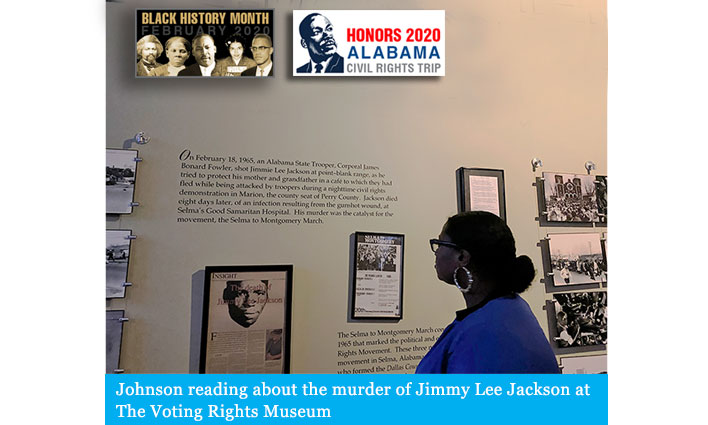
Walking through The Legacy Museum on the Honors 2020 Alabama Civil Rights Trip brought up intense feelings for Tyler Johnson ’22. Seeing haunting photos of black men, women, and children being murdered—simply because of the color of their skin—took Johnson to an emotional edge. In her essay, Johnson, a Humanities and Justice major from the Bronx, New York, grapples with the pain she’s felt growing up black in America, and the anguish she experienced after seeing the brutal history of slavery, lynching, and racial segregation that was presented plainly before her.
Her Essay
Within the 19 years of my life, I have had to fight a battle that was unbeknownst to me. This battle is one that has made me fight harder, speak louder, and become more unapologetic. This battle involves my black mind and body. The temple I was blessed to be born with, with skin so brown that it shimmers in the summertime, and curves so vivacious that they make the world go ’round. This temple of spirituality and beauty holds the blood of my ancestors, whose bodies were stripped away from them, whose voices were silenced by their oppressors. The thoughts passed down from generations of strong, black people have come to the realization of reality. Although I am in love with my blackness, I have come to notice that the black mind and body carries the deficits of slavery.

We are split into two entities. The black body induces a facade: a whitewashed version of ourselves in order to achieve more in society. This version shows up in our educational and professional settings. Black people have mastered code switching so well that it becomes disgustingly natural. From the way we perk up our voices and lower our tones in order to fit into white corporate society. The ideology of code switching has been passed down from our older generations. The words of our mothers and fathers telling us to speak in a certain tone when dealing with white folks, so they feel at ease. We fall victim in protecting the white fragility concept orchestrated by the same people who were far from fragile when they raped, lynched, terrorized, and broke our communities. And while they are at ease, we are uneasy.

We look back at our whitewashed entity, sometimes in disgust. I look back at my whitewashed self and I learn. I realize that while I was under that facade, I was unconsciously unmasking the microaggressions and blatant racism that I was experiencing. I used this mechanism to navigate my way in life, quickly pointing out racism and bigotry that was masked with passive aggressive comments. This facade, although unhealthy, became my weapon into being powerful, blunt, and knowledgeable.

“The stories of my people being terrorized, beaten, and dehumanized pushed me further to become the catalyst of uncensored voices when it comes to black history.” —Tyler Johnson
I want to use my words to directly address white people: Trust and believe that this facade was not a presentation of our “ignorance,” but a representation of your unwillingness to be in uncomfortable situations. Your ignorant implicit biases when it comes to the black mind, unveils generations of the vile, inhumane sentiments passed down from your parents, and their parents who have greatly benefited off the backs of black people. Realize that when you are uncomfortable talking about your history, you become the same slave masters that your great-grandfathers were. In post-modern society, this slave-master mindset is represented when you wave Confederate flags and host Unite the Right rallies to uniform white supremacy. When you erase the message behind the Black Lives Matter movement, and mask it with All Lives Matter, it’s because you’re invested in believing that white people are always the victims.

“A person who doesn’t know their history is bound to repeat it. Our ancestors have fought too long, and too hard, to look down on us and see a modernized version of the slavery and civil rights era.” —Tyler Johnson
During my time in Alabama, I appreciated the raw, uncensored history that was presented to me in such creative ways. The stories of my people being terrorized, beaten, and dehumanized pushed me further to become the catalyst of uncensored voices when it comes to black history. My voice, my words, who I am will not be silenced in order to promote a “safe” history that makes white people feel at ease. I encourage everyone—especially my black brothers and sisters—to do outside research on black history. Go beyond Martin Luther King Jr. and Malcolm X. Learn about Ida B. Wells, Sojourner Truth, Angela Davis, Elaine Brown—all coming from different eras, yet holding the important principle of fighting for the deserved rights of black people. A person who doesn’t know their history is bound to repeat it. Our ancestors have fought too long, and too hard, to look down on us and see a modernized version of the slavery and civil rights era.



